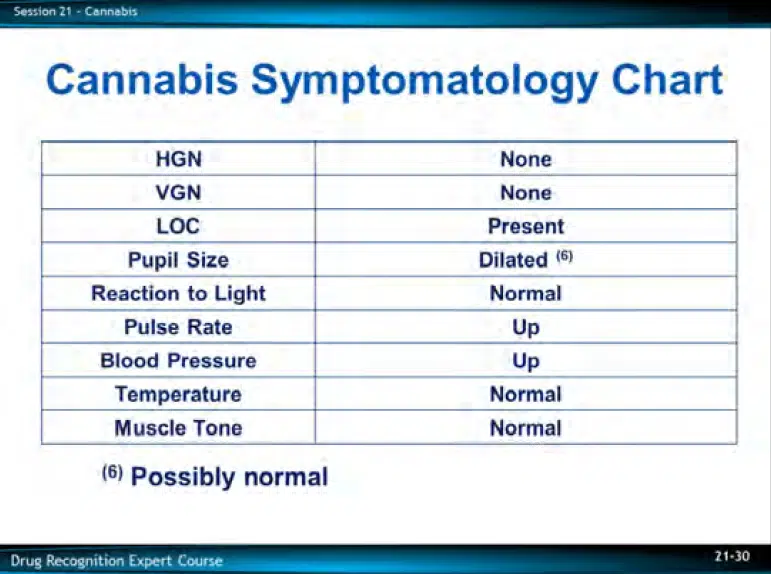In an effort to determine whether drivers are under the influence of a drug, NHTSA and the International Association of Chiefs of Police (IACP) developed the Drug Evaluation and Classification Program (DECP). The DECP developed a 12-step protocol, referred to as a Drug Influence Evaluation or Drug Recognition Evaluation, that is used to determine whether a driver is under the influence of a drug, including marijuana. A Drug Recognition Expert (DRE) is an officer trained to administer the Drug Recognition Evaluation.
The DRE protocol consists of the following 12-steps:
- Breath alcohol test
- Interview of the arresting officer
- Preliminary examination and first pulse reading
- Eye examinations
- HGN
- VGN
- Lack of convergence
- Divided attention tests:
- Modified Romberg
- Walk and Turn
- One Leg Stand
- Finger to Nose
- Vital signs:
- Blood pressure
- Body temperature
- Second pulse reading
- Dark room examination (pupil examination under 3 different lighting conditions):
- Room light
- Near-total darkness
- Direct light
- Muscle tone examination
- Check for injection sites and third pulse
- Interview of the suspect
- Analysis and opinion of the evaluator
- Toxicological examination
Drivers who may have used marijuana are expected to exhibit the following indicia of use following a DRE Evaluation:

After administering a DRE Evaluation, DRE officers give an opinion as to whether they believe the person may be under the influence of marijuana and too impaired to drive. The DRE officers will come to court and testify that based on the DRE Evaluation, they believed the person was under the influence of marijuana.
The problem with this line of testimony and DRE Evaluations as a whole is that they have never been demonstrated to reliably allow officers to determine if someone is impaired by a drug. Many studies have found (accurately or not) that the DRE Evaluation allows DRE officers to predict what drug a person has taken with some level of accuracy. But, no study has demonstrated the ability of the DRE Evaluation to reliably predict whether someone is too impaired to drive, which is the ultimate question in a marijuana DUI case.




